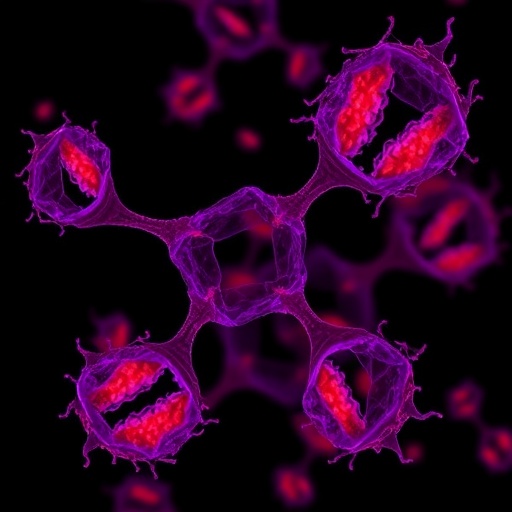In a groundbreaking new study published in Nature Metabolism, researchers have unleashed pivotal insights into the molecular underpinnings of muscle wasting seen in cancer cachexia, a devastating syndrome that drastically diminishes quality of life and survival rates among cancer patients. The study, led by Angelino, E., Bodo, L., Sartori, R., and colleagues, reveals for the first time how disruptions in the cAMP–PKA–CREB1 signaling axis directly contribute to mitochondrial dysfunction in skeletal muscle, offering a fresh lens through which to understand this complex condition.
Cancer cachexia remains a formidable clinical challenge, marked by profound muscle atrophy and systemic metabolic derangements. Despite its significant impact, the precise molecular players driving the muscle decline have remained elusive. This latest investigation sheds light on how aberrations in intracellular signaling pathways unwrap a cascade of detrimental effects culminating in impaired mitochondrial integrity and function within muscle cells.
The study focuses on the cyclic AMP (cAMP) – protein kinase A (PKA) – cAMP response element-binding protein 1 (CREB1) pathway, a well-known signaling cascade involved in regulating diverse cellular processes including metabolism, gene expression, and cell survival. Normally, activation of this axis ensures mitochondrial biogenesis and optimizes energy production, thereby preserving muscle function. However, through meticulous in vivo and in vitro analyses, the researchers demonstrate that in the context of cancer cachexia, this signaling route is markedly suppressed.
Their data reveal a significant downregulation of cAMP levels in skeletal muscles affected by cachexia, which in turn cripples PKA activity. This reduction leads to decreased phosphorylation and activation of CREB1, an essential transcription factor governing the expression of genes critical for mitochondrial maintenance. Without proper CREB1 function, the muscle cells’ mitochondrial population becomes dysfunctional, losing their efficiency to generate ATP and manage reactive oxygen species.
Importantly, the study delineates that the impaired signaling cascade directly causes structural and functional mitochondrial abnormalities. Electron microscopy images capture the morphological distortions—swollen, fragmented mitochondria with disrupted cristae—mirroring classic signs of mitochondrial stress and dysfunction. These organelle defects compromise cellular energy metabolism, driving the exhausting muscle wasting characteristic of cachexia.
Through transcriptomic profiling, Angelino and colleagues identify a suite of downstream targets regulated by CREB1 that are crucial for mitochondrial dynamics, biogenesis, and oxidative phosphorylation. The suppressed expression of these genes underlies not just mitochondrial structural damage but also the metabolic inflexibility observed in cachectic muscles, locking the cells into a catabolic state that exacerbates muscle breakdown.
In an elegant series of rescue experiments, the team pharmacologically reactivates the cAMP–PKA–CREB1 pathway in murine models of cancer cachexia. Remarkably, restoring this signaling cascade effectively reverses mitochondrial defects, enhancing muscle function and attenuating the cachexia-induced wasting. These findings underscore the therapeutic potential of targeting this signaling axis to preserve muscle integrity in cancer patients.
The implications extend beyond cancer-associated muscle loss since mitochondrial dysfunction is a hallmark of numerous degenerative diseases. The study’s mechanistic insights provide a valuable platform for exploring novel interventions to counteract muscle decline in broader clinical settings, including aging and chronic inflammatory disorders.
Moreover, the research illuminates how systemic factors released by tumors may hijack intracellular signaling within skeletal muscles, suppressing cAMP production and orchestrating bioenergetic collapse. This highlights the intricate crosstalk between tumor biology and host metabolism, deepening our understanding of the systemic nature of cancer cachexia.
By elucidating the precise molecular circuitry that falters during cachexia, this study opens avenues for biomarker development, offering clinicians tools to detect early mitochondrial dysfunction and stratify patients who might benefit from targeted signaling modulators.
As the field advances, translating these preclinical findings into human clinical trials will be crucial to assess the safety and efficacy of interventions aimed at boosting the cAMP–PKA–CREB1 axis. Success in such trials could herald a paradigm shift in managing cancer cachexia, shifting from symptomatic relief to mechanistically driven therapies that address the root cause of muscle deterioration.
This compelling narrative of cellular signaling gone awry during cancer cachexia resonates beyond oncology, emphasizing the universal importance of mitochondrial health in sustaining physiological resilience against catabolic stressors.
The synergy between fundamental molecular biology and translational research showcased here exemplifies the power of integrated approaches to solving pressing biomedical challenges. The work by Angelino et al. stands as a beacon for future studies aiming to unravel the molecular labyrinth governing muscle metabolism in health and disease.
In sum, the impairment of the cAMP–PKA–CREB1 signaling axis emerges as a central driver of mitochondrial failure in skeletal muscle during cancer cachexia, unmasking a promising target to mitigate muscle wasting and improve patient outcomes. This study not only advances our scientific comprehension but also fuels hope for innovative therapies to combat one of the most pernicious complications of cancer.
Subject of Research: Cancer cachexia-induced mitochondrial dysfunction in skeletal muscle mediated by impaired cAMP–PKA–CREB1 signaling.
Article Title: Impaired cAMP–PKA–CREB1 signalling drives mitochondrial dysfunction in skeletal muscle during cancer cachexia.
Article References:
Angelino, E., Bodo, L., Sartori, R. et al. Impaired cAMP–PKA–CREB1 signalling drives mitochondrial dysfunction in skeletal muscle during cancer cachexia. Nat Metab (2025). https://doi.org/10.1038/s42255-025-01397-5
Image Credits: AI Generated
DOI: https://doi.org/10.1038/s42255-025-01397-5
Tags: cAMP PKA CREB1 signaling disruptioncancer cachexia and muscle wastingcancer-related muscle declineimplications of mitochondrial dysfunction in cancer patientsintracellular signaling pathways in cancermitochondrial integrity in skeletal musclemolecular mechanisms of muscle atrophymuscle metabolism and energy productionmuscle mitochondrial dysfunction in cancerskeletal muscle and mitochondrial healthsystemic metabolic derangements in cancertherapeutic targets for cachexia treatment





